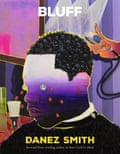
Bluff by Danez Smith (Chatto & Windus, £14.99)
In this excoriating collection, we see Smith painfully question their role as an artist in the wake of the Black Lives Matter protests that erupted after the murder of George Floyd, in their hometown Minneapolis-St Paul; along with the failures of liberal progressivism in terms of race, class, queerness and gender. Of their support of Obama they write, “Admit it Danez, you loved / Your master … loved / Knowing the colour at the end of my chain / Matched mine … Forgive me, I wrote odes to presidents.” Smith’s interrogation of poetry’s complicity in suffering is expressed in brilliantly crafted, rhythmically complex verse – “I was part of the joy / industrial complex … forced the dead to smile & juke.” Smith powerfully attacks America’s oppressions, while also violently rejecting the white establishment’s hollow feting of their work – “we wanted to stop being killed & they thanked me for beauty … I bowed & worse, smiled. / teach me to never bend again.”
Fantasia by Nisha Ramayya (Granta, £12.99)
An explosive and wildly intelligent collection from one of the UK’s most exhilarating poets, considering how sound and listening might be entangled with politics, liberation and transformation: “What’s listening to/ the sound of the spheres of the unborn, while the born are crying/ here?” These sonically fierce, experimental poems wrestle with the difficulty of making one’s true self known through sound: “the thought of / speaking, of hearing herself speak, of compelling body to expend / more breath … of interiority exiting the body without smell, stain …” At the same time as speech can fail, music can escape “the stranglehold of stories told and retold”. The freeing music of jazz legend Alice Coltrane resonates throughout, sound that goes beyond the heavy weight of rotten and oppressive histories – “our ears, like seashells, still / multitudinously murmuring of the ocean as we flee / through spiracle, as we fountain, glitter, celestify”.
a great shaking by Edwina Attlee (Tenement, £16.50)
This profoundly exciting debut explores the complicated embodiments, politics and emotions of domestic life through the prism of the turning year. Attlee draws subtly luminous images from mundane, ordinary life – “I pat her gloves with apricot foam / blow bubbles in the dusk / with liquid from the pound shop” – allowing us to see the vivid, electric power of moments to which familiarity usually blinds us. At the same time, she is always aware of the vexed inequalities of family, time, class and gender – “joy unfurls from coupledom and a shared bank account / watch out or the big horse trudges on your head”. Her writing about childrearing is painfully tender yet radical: “they pack him differently at the nursery … am I letting them snuff it out / the little yellow flame”. In this beautiful, funny and innovative book, an important new poetic voice has emerged.
Ruin, Blossom by John Burnside (Jonathan Cape, £13)
John Burnside was one of the finest poets of his generation, and with his death in May, we find poetry much the poorer. Ruin, Blossom, his final collection, has many of the elements we’ve come to expect: lyrical reflections on Christian themes, snow and stillness, as well as a potent attention to the momentariness and grace of the self as it meets the world. “Close to invisible now, my shadow wakes / to juniper and new snow in an empty / garden, fox-prints trailing off to what might be/ infinity …” The central poem, Bedlam Variations, considers the experience of psychosis and treatment – “We drift into the grey / of evening, while the trolley makes its rounds, / bringing the sweet hiatus of Largactil” – communicating the strange mixture of agony and hope that can typify recovery. Burnside’s sharp, suturing language allows us to know the world as it is: ragged and broken, yet full of impossibly fragile beauty. “Shuttered kiosks, windows bleared with dew, / house martins threading the streets/ in the fretwork of dawn.” I will miss seeing the world through his eyes.
Tanya by Brenda Shaughnessy (Bloodaxe, £12.99)
The Okinawan-Irish American poet’s sixth collection is an ode to influence and inspiration. Numerous poems engage with the female artists who have expanded her thinking, including choreographer Lauren Lovette and painter Torkwase Dyson; poems that are acts of homage, and explorations of what it means to create. “The artist’s eye sees past vision, past even the notion of vision / … but gives voice to motion”. Shaughnessy’s rhythmic, sonically intense poetry embodies this motion, restlessly interrogating the communal experience of artmaking. In the title poem she turns this questioning verse towards the influence of a difficult, formative relationship: “What are we if we stop / knowing each other? … Everyone’s not-you to me … I know you now and forever / my blood and water.” In this poem, the boundaries of the self begin to blur, the poet changed by the impact of love, remade.
